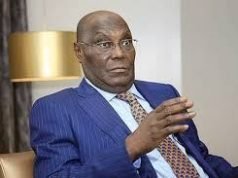
Two United States election Institutes that monitored the 2019 elections in Nigeria, the National Democratic Institute (NDI) and the International Republican Institute (IRI), have said that the polls did not meet the expectations of Nigerians.
But, the Presidency insisted that despite some minor lapses that are not common only to Nigeria, the elections were legitimately won and lost.
In their Joint report released today, June 18, the institutes said that 2019 general elections were marred by irregularities such as intimidation of voters and electoral officials, vote-buying, and election-related violence.
The report condemned the suspension of the former Chief Justice of Nigeria, Walter Onnoghen, ahead of the election, basing its condemnation on the fact that the judiciary plays a crucial role in post election matters.
The joint report said: “although many new political parties nominated candidates for the 2019 elections, the polls were largely a contest between the incumbent All Progressive Congress (APC) and the People’s Democratic Party (PDP). The APC hoped to renew the mandate of President Muhammadu Buhari and consolidate its majority in the National Assembly and of governorship. However, the party faced internal wranglings and defections of some key figures in the months to polls.
“The PDP fielded former Vice President Atiku Abubakar as its standard bearer and, entering the process for the first time as an opposition party, challenged the APC record, claiming the ruling party had not kept its campaign promises to fight corruption, improve security and boost the economy.
“But the IRI/NDI observation mission concluded that the 2019 elections did not meet the expectations of many Nigerians.”
On security and election related violence, the report said: “ahead of the 2019 polls, the poor security situation in Nigeria, mainly attributed to Boko Haram’s resurgence in the North East, inter-communal violence in the Middle Belt and widespread crime and banditry, raised concerns about the safety of voters and candidates.
“Increased politically motivated violence and conflict in the pre-election period was also a concern, especially around political party primaries in some areas and with some alleged POW!
“To many Nigerians, the 2019 elections – the sixth since the country’s 1999 transition back to civilian democratic rule -were an opportunity to consolidate democratic gains and build on sound electoral practices. Significant improvements in the administration of the 2011 and 2015 elections boosted expectations the 2019 electoral process. Moreover, Nigeria’s first peaceful transfer of power between political parties following the 2015 elections underscored for Nigerians that credible elections matter.”
The joint report said that the last-minute postponement of the presidential and National Assembly elections on Feb. 16 showed that INEC had underestimated challenges associated with the administration of the elections.
“The commission did not communicate sufficiently with political parties and the public about election preparations. Such a late postponement likely depressed voter turnout and created confusion about the duration of candidate and party. Most significantly, the delay also undermined public confidence in INEC.”
Reacting to the report in a statement by the senior special assistant to President Muhammadu Buhari on media and publicity, Malam Garba Shehu, the Presidency insisted that Buhair “clearly won this vote and the report in no way disputes that fundamental fact.
“President Buhari won by almost 4 million majority, with a 14% margin.”
The Presidency said that the most important thing in an election is that it reflects the will of the people which in Nigeria’s circumstances was acknowledged to have been a success by ECOWAS Observer Mission and YIAGA AFRICA whose parallel vote tabulation verified INEC’s presidential election result as announced. “This we achieved.
“We have developed a tradition of improvements in our electoral process through enforcement of our electoral law which resulted in the prosecution and conviction of electoral officers that were found wanting in compromising our electoral process.
“We, however, agree notwithstanding, that there are improvements that must be made in the process for the future. “The sheer size, terrain and remoteness of certain regions do pose serious logistical challenges.
“They also pose a problem for electoral observers: across a country of over 190 million, only 40 observers were deployed to observe just 16 states + the Federal Capital Territory (Nigeria has 36 states).
“It was unfortunate that the election was postponed yet imagine if the Independent National Electoral Commission (INEC) had gone ahead unprepared. The delay undoubtedly resulted in a lower turnout.
“Because they are registered to vote in their place of birth, and not where they live, many Nigerians could not make arrangements to travel back again.
“But the fact still remains that major democracies of the world have equally recorded worst turnout in modern history.
“The effect of voter turnout, at any rate, is a two-way traffic that affected both sides equally.
“To pretend otherwise is wrong considering that in 2015, the INEC postponed the election by six weeks under a PDP President, whom – as an incumbent – it was said to help at the time. It didn’t make a difference. Similarly, neither did it aid the sitting President in 2019.
“It is amazing that the electoral observers recommended that electoral laws are enforced, and perpetrators of crimes punished and at the same time implicitly criticise the removal of the Chief Justice of Nigeria for failing to disclose his assets as required by law. Which would they prefer?
“The law is a matter of principle that takes its course regardless of time and circumstances. It is never a matter of convenience and indeed remains functional, operational and enforceable without due regard to the electioneering process.
“As we have already said, we are committed to reviewing our electoral laws and processes, like every democracy across the world should.
“We intend to build on the innovations of this election that facilitate inclusiveness and participation, such as providing braille for blind people to cast their votes among other innovations.
“This election was won by the candidate who received the most votes. We value the report’s recommendations. We can assure they shall be assessed and evaluated.”






